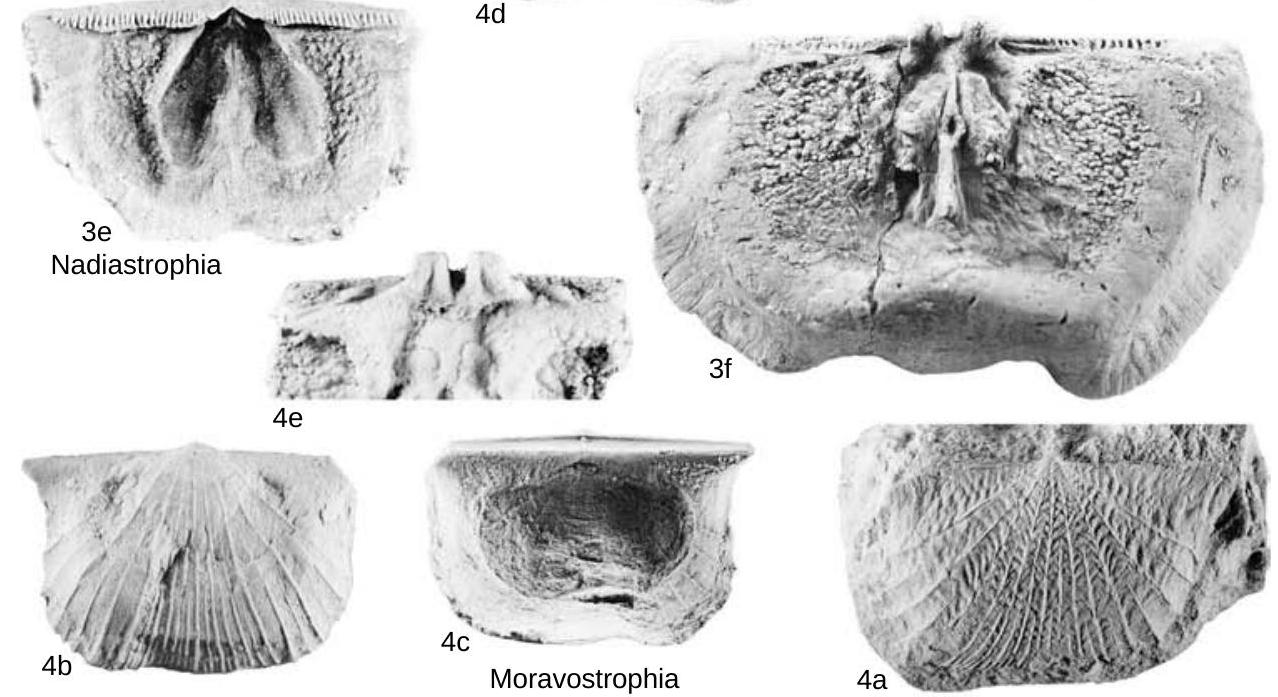Welcome to the Treatise on Invertebrate Paleontology!
Please enter a genera name to retrieve more information.

Nadiastrophia
Classification
Phylum:
Brachiopoda
Subphylum:
Rhynchonelliformea
Class:
Strophomenata
Order:
Strophomenida
Superfamily:
Strophomenoidea
Family:
Douvillinidae
Subfamily:
Protodouvillininae
Formal Genus Name and Reference:
Nadiastrophia TALENT, 1963, p. 62
Type Species:
N. superba, OD
Images
(Click to enlarge in a new window)
Fikg. 170,3a,b. *N. superba, Kilgower Member, Tabberabbera Formation, Emsian, Mitchell River, south of Tabberabbera, Victoria, Australia; a, ventral internal mold, GSV 5889a, × 3; b, dorsal internal mold, GSV 56578a, × 3 (Harper & Boucot, 1978).——Fig. 170,3c–f. N. yukiangensis (WANG), Liujing Member, Yukiang Formation, lower Emsian, Liujing railway station, Hengxian County, southern Guangxi, China; c,d, dorsal, lateral views of conjoined valves, BMNH BC 12833, × 2; e, ventral interior, BMNH BC 12834, ×2; f, dorsal interior, NIGP 23618, ×2 (new).
Synonyms
Xenostrophia
Geographic Distribution
Australasia, China, Canada
Age Range
Beginning Stage in Treatise Usage:
Devonian (Emsian)
Beginning International Stage:
Emsian
Fraction Up In Beginning Stage:
0
Beginning Date:
410.51
Ending Stage in Treatise Usage:
Devonian (Eifelian)
Ending International Stage:
Eifelian
Fraction Up In Ending Stage:
100
Ending Date:
385.3
Description
Profile gently concavoconvex, sharply geniculate in both valves, ornament unequally parvicostellate, hinge line denticulate along most of width, bilobed ventral muscle field chiefly elongate, muscle-bounding ridges present laterally, sometimes weakly anteriorly, ventral subperipheral rim developed in gerontic specimens, erect, posteriorly directed cardinal process lobes, myophragm variably developed, dorsal side septa vary from strong to very weak, dorsal muscle field on elevated platform with short bounding ridges present posterolaterally, dorsal median septum variably developed centrally, occasionally anteriorly, but sometimes absent, variably developed dorsal subperipheral rim.
References
Museum or Author Information
Classification
Phylum:
Brachiopoda
Subphylum:
Rhynchonelliformea
Class:
Strophomenata
Order:
Strophomenida
Superfamily:
Strophomenoidea
Family:
Douvillinidae
Subfamily:
Protodouvillininae
Formal Genus Name and Reference:
Nadiastrophia TALENT, 1963, p. 62
Type Species:
N. superba, OD
Images
(Click to enlarge in a new window)
Fikg. 170,3a,b. *N. superba, Kilgower Member, Tabberabbera Formation, Emsian, Mitchell River, south of Tabberabbera, Victoria, Australia; a, ventral internal mold, GSV 5889a, × 3; b, dorsal internal mold, GSV 56578a, × 3 (Harper & Boucot, 1978).——Fig. 170,3c–f. N. yukiangensis (WANG), Liujing Member, Yukiang Formation, lower Emsian, Liujing railway station, Hengxian County, southern Guangxi, China; c,d, dorsal, lateral views of conjoined valves, BMNH BC 12833, × 2; e, ventral interior, BMNH BC 12834, ×2; f, dorsal interior, NIGP 23618, ×2 (new).
Synonyms
Xenostrophia
Geographic Distribution
Australasia, China, Canada
Age Range
Beginning Stage in Treatise Usage:
Devonian (Emsian)
Beginning International Stage:
Emsian
Fraction Up In Beginning Stage:
0
Beginning Date:
410.51
Ending Stage in Treatise Usage:
Devonian (Eifelian)
Ending International Stage:
Eifelian
Fraction Up In Ending Stage:
100
Ending Date:
385.3
Description
Profile gently concavoconvex, sharply geniculate in both valves, ornament unequally parvicostellate, hinge line denticulate along most of width, bilobed ventral muscle field chiefly elongate, muscle-bounding ridges present laterally, sometimes weakly anteriorly, ventral subperipheral rim developed in gerontic specimens, erect, posteriorly directed cardinal process lobes, myophragm variably developed, dorsal side septa vary from strong to very weak, dorsal muscle field on elevated platform with short bounding ridges present posterolaterally, dorsal median septum variably developed centrally, occasionally anteriorly, but sometimes absent, variably developed dorsal subperipheral rim.
